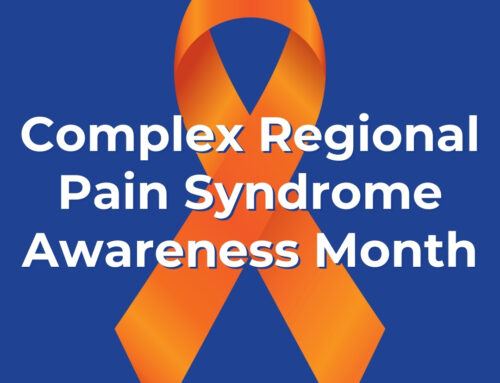 by Laura Stockdale, PhD, MSN
by Laura Stockdale, PhD, MSN
Usually when people think about the concept of grief, they think about grieving a loved one that has died. So you may ask, what does grief have to do with chronic pain? How can I use what we know about grief to cope more effectively with my pain? Am I grieving because I have chronic pain?
Let’s answer that last question first. Have you ever had the following statements cross your mind, or you’ve maybe even said them out loud: “This is not what I expected my life to be; God, why did this happen to me?; I can’t work the job I used to, what do I do now?; Yeah I’m mad, this was not my fault; I’m of no use to my family now.” If you ever said any of these out loud or thought them, then you are, or have been, grieving.
So, let’s look at what grief has to do with chronic pain. As I said before, most people think of death when they think about grief. But grief is relevant anytime we are talking about a loss of some kind. We lose loved ones to death. We lose marriages to divorce. We lose our youth because we grow old. We lose our health due to cancer or other illness. We lose our job to any number of reasons: downsizing, retirement, an illness, etc. So anytime we suffer a loss of any kind, we have to grieve. When I am interviewing pain patients and ask them “What can you not do now, that you used to do before you had pain? And what do you wish you could do again?” The answers are as variable as the individuals I meet. Some of these answers include simple, everyday things like mopping the kitchen floor, changing the oil in the car, playing with my grandchildren, hiking in the Smokies, playing bridge because I can’t sit long. All of these are activities for which we grieve. And just like grief of a loved one, loss of these things doesn’t mean our whole life is not worth living, we just need to work through the losses of our activities, self-concept, and self-esteem, etc. (More on working through the issues in my next blog.) The key idea is not to get stuck in the grief that is associated with our pain.
Before we can talk about “working through” the grief related to pain, let’s look more at the overall concept of grief. There’s been a lot of research, opinion, theorizing about grief. Most people associate the name of Katherine-Kubler Ross with the word “grief”, as she was one of the first people to look at grief as a process. By process, she found that recovery from grief does not happen overnight. It takes time. She delineated different stages that a person goes through, when they grieve: denial, anger, bargaining, depression, and acceptance. My motive in helping you to understand the stages is to let you know that you’re not crazy and to offer hope that, since it is a process, things can and will get better. One caveat though, some people think of stages as sequential, like one, two, three, and so on. Sometimes people get stuck in one stage or they find themselves going back because of environmental stressors. If you find this happening to you, don’t lose heart. With work, support, and time you’ll navigate through the stages again. So let’s talk about the various stages in grief:
- Denial: this occurs when you find yourself saying “this cannot be happening to me.” If someone is injured on the job, or their chronic pain develops after surgery, you may see this more quickly and expressed more strongly. If the pain onset is gradual, due to some kind of deteriorating illness or gradual degenerative disc disease, diabetic neuropathy, etc. you might not say the sentences as strongly or clearly. But denial is still there.
- Anger: the next step is anger. Now that it has settled in, and you know that your pain is real, you may find yourself feeling angry. Many of us have had difficulty with this emotion, and don’t know how to express it. Or don’t even give ourselves permission to have it. We were taught to see anger as unseemly, not polite, not adult. We’ve been taught that to be angry at God is a sin. The difficulty with this kind of learning is that you never express the anger, so you can never, “work through it.”
- Bargaining: speaking of God, bargaining often happens in a religious or spiritual context, no matter what your spiritual beliefs may be. Or if you have no spiritual beliefs, bargaining is still present, sometimes with the cosmos in general or sometimes with healthcare providers. Statements that indicate that you are bargaining include: “Doc, if you can just fix this neuropathy pain I will never smoke again.” “God, take this pain away and I will be at church every time the doors are open.” Bargaining is not bad, it’s a mental exercise that helps us feel like we have some control, but if it lasts too long we get stuck in this stage. When our bargaining does not come to fruition, we get disappointed, frustrated and mad. So now we are back to the anger phase. (See, I told you that sometimes the stages are circular and we have to work to them many times.)
- Depression: this is probably the longest, most difficult, and most debilitating stage of grief, and merits a blog entry of its own. But in short, depression is when the sadness that results from dealing with the changes in our life sets in. When we are depressed it’s difficult to hold on to the idea that our life will get better. (Notice that sentence says “our life will get better”, not perfect.) Whatever you thought your life would be, when it is changed for whatever reason – dealing with chronic pain, dealing with the death of a friend, retiring from a job you love – sadness will set in. The best thing to do with the sadness is to acknowledge it, express it, and experience it. There are different things that help different people work through depression and not everybody is comfortable with it. It is safe to say that you can’t express your depression with “just anybody “– it takes a good friend, a pastor, a family member or somebody you trust or many people that you trust to help you move through the stage of depression. Plus, different people express depression in different ways. For some people crying helps. Other people might draw, paint, scream, curse. Some want to talk about it, some don’t want to talk at all. The overall goal is that each day gets a little better every day. Sometimes it’s a delicate balancing act: pushing yourself to go on and do what you have to do even though you feel incredibly sad, while knowing when to back off and not push yourself so hard. A certain level of depression is normal with any kind of loss. Sometimes folks need the help of antidepressants – especially if the depression doesn’t seem to be getting any better over a period of time. The most serious indicator of depression includes feelings like you cannot go on, thoughts of death, feelings of helplessness/hopelessness. If you have these talk to your doctor and/or family immediately. Other indicators that you might need antidepressants include the following: (1) not finding pleasure in anything (not grandchildren, not hobbies, not your favorite movie, etc.) that used to cause you to feel joy or happiness; (2) feeling sad most of the day for several days in a row; (3) sleeping all the time or having difficulty with sleep; (4) changes in weight – either gaining or losing- without any explanation; (5) having difficulty concentrating or making decisions.
Any time you have any concerns about if what you are feeling is okay – don’t be afraid to talk to somebody about it. Because that’s how we help each other get through tough times in our life. As stated in the beginning of this article, the idea of grief can help us organize our thoughts while we are looking at living with chronic pain. Sometimes if we know what’s going on with us psychologically, our emotions and feelings don’t seem quite so scary.
It’s been my experience that anytime we are wondering how we are handling something, a sympathetic but objective ear can do wonders to make things seem clearer. That’s why I’ve used the following slogan in my work as a counselor, and in my personal life, for several decades:
“When you share a joy you double it. When you share a trouble you cut it in half.”



